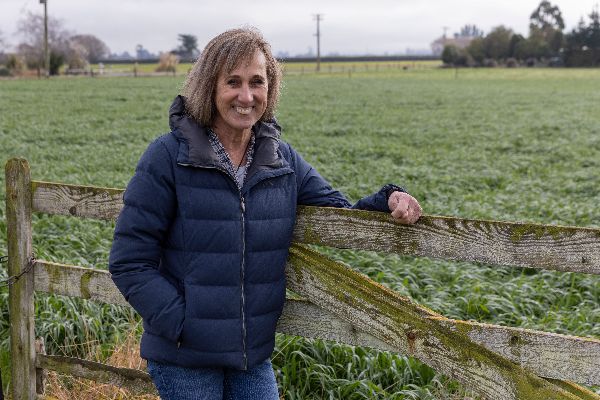Genetics Focus Improves Dairy Herd
A strong focus on genetics and DNA has paid dividends for Fernside dairy farmer Julie Bradshaw with four of her cows being selected for Livestock Improvement Corporation’s (LIC’s) breeding programme.

Julie is participating in a farming innovation project, which examines how the next generation of farmers are using innovative approaches to improve their farming practices. Waimakariri Landcare Trust (WLT) and Waimakariri Irrigation Limited (WIL) have partnered with the Ministry for Primary Industries (MPI) for the project, with support from MPI’s Sustainable Food and Fibre Futures fund along with Environment Canterbury, Ballance, and DairyNZ.
The four cows have been selected for the breeding profile based on their DNA profiles. In the next mating season these cows will be mated to bulls specifically selected by LIC for genetic traits which will complement cows’ traits. The aim is to improve the overall genetic profile of the herd.
“LIC have looked at their mothers and analysed their production during the selection process. Once they have calved if it is a bull calf then they will genetically test it to determine if it meets the criteria for LIC’s breeding programme.
“DNA testing the calves shows which genes it has inherited from its parents and then they can analyse how well it will perform in the future.”
Over the last 20 years since Julie first became interested in genetics, technology has become far more precise than when she did the first DNA tests on her herd, and this is providing economic benefits to her farming operation.
“The rate of change with science and technology is amazing. DNA testing is a vital part of our farming operation now and I am glad we started when we did because it has enabled us to have the best herd we can which is based on science and facts.
“With possible reductions in animal numbers in the future you want to be as accurate as possible. If you are relying on your own calving records, they are generally only about 65 to 70 per cent accurate compared to DNA testing. Calving data is never perfect because you are under a lot of stress when you are calving.
“If you use your own records, you are keeping animals that you think are going to be great, when you haven’t got the animal you think you have in terms of its value to the herd. DNA testing sorts out your mistakes and you avoid spending time and money on a calf that is not going to produce anything once it joins the milking herd.”
Julie’s Production Worth (PW) and Breeding Worth (BW) herd sit in the top five per cent of Canterbury herds and just under the top five per cent of all herds nationally which she says proves that her investment in genetics has enabled her to refine her herd to ensure that she has the best cows.
“Working with LIC over the last 20 years has really paid off for us. We have all our DNA data for the herd, and it really is the best it has ever been. You know that you are on the right track, and we are passionate about the future of genetics for farming in New Zealand.”


 Hugh Grant: How To Build Confidence In The Data You Collect
Hugh Grant: How To Build Confidence In The Data You Collect Tourism Industry Aotearoa: TRENZ 2026 Set To Rediscover Auckland As It Farewells Rotorua - The Birthplace Of Tourism
Tourism Industry Aotearoa: TRENZ 2026 Set To Rediscover Auckland As It Farewells Rotorua - The Birthplace Of Tourism NIWA: Students Representing New Zealand At The ‘Olympics Of Science Fairs’ Forging Pathway For International Recognition
NIWA: Students Representing New Zealand At The ‘Olympics Of Science Fairs’ Forging Pathway For International Recognition Coalition to End Big Dairy: Activists Protest NZ National Dairy Industry Awards Again
Coalition to End Big Dairy: Activists Protest NZ National Dairy Industry Awards Again Infoblox: Dancing With Scammers - The Telegram Tango Investigation
Infoblox: Dancing With Scammers - The Telegram Tango Investigation Consumer NZ: This Mother’s Day, Give The Gift Of Scam Protection And Digital Confidence
Consumer NZ: This Mother’s Day, Give The Gift Of Scam Protection And Digital Confidence